Journal of Korean Library and Information Science Society 2024 KCI Impact Factor : 0.91
-
pISSN : 2466-2542
- https://journal.kci.go.kr/liss
pISSN : 2466-2542
Remnants of Culture in Journal Article Titles: A Comparison between the United States and Korea in the Field of Social Sciences
1계명대학교
Every academic journal articles published in the world requires a title. Regardless of the language used to write the journal article, most journals around the world normally require authors to submit journal article titles in English. In Korea, an English title must also be submitted along with a Korean title. Such a requirement appears to be partly motivated by the fact that titles written in English helps to meet international academic standards. In addition, the titles of journal articles in English can increase marketability and visibility to readers outside of Korea. Thus having a journal article title in English, in general, satisfies various requirements known to the academic communities in Korea.
Despite the promotion of the use of English in the academic community, writing a journal article title in English for novice Korean researchers can be a difficult task. Such a case is especially true for authors who prefer to submit their manuscripts to internationally recognized journals, since international journals prefer every aspect of manuscript to be well written. Considering the fact that title is usually the first element that readers usually read before reviewing an article, it is not surprising to know that the title of the journal article must be carefully constructed to attract readers.
An effective title needs to represent the content of the article in a most concise and proper manner. A journal article title should be written using terms and phrases that are as clear and acceptable as possible within the specific disciplinary community. For this reason, it requires some level of mastery in the language that the title is written in. The vocabularies and linguistic expressions should be appropriately and carefully selected for the title. Furthermore, the title has to attract members of a particular academic community and concisely deliver the articles' thesis. Most successful authors would agree with these suggestions on writing journal article titles.
Despite this, most authors and reviewers are insensitive to the fact that cultural differences at a national level exist in writing titles. Moreover, a vast majority of academic journal in Korea are written in the Korean language rather than English. Due to difficulties in writing academic titles in English, Korean authors might write the title in Korean first. Then, after this initial process, authors in Korea are likely to translate the title of the paper along with the other required metadata just before the final journal article submission.
In general, titles written in English for Korean journals can be considered as a guidepost in order to discover the conventional practices of Korean authors.
Meanwhile, from an information science perspective, titles are closely associated with the notion of information.
As an interesting element of titles that can be discovered, this paper intends to show the remnants of culture in the journal article titles. Apart from this, the intention of this paper is to promote understanding of the cultural aspects of the titles. Discovering how researchers in a country in a particular discipline write titles has practical implications since we live in a globalized academic community. As will be discussed in the subsequent section, previous research has shown that titles can potentially provide insights into various aspects of a particular discipline. For the purpose of the this paper, the study has focused on comparing U.S. and South Korea in an attempt to reveal characteristics of journal article titles in the context of culture.
In order to find the cross-national characteristics between Korea and the U.S., different elements of the titles were quantified and examined. More specifically, the journal paper titles published in Korean journals and the U.S. journals are compared by quantitatively analyzing the title types as well as the elements of titles such as common terms and phrases. As for the data, two bibliographic databases ―
Much of previous research focused on disciplinary characteristics of titles suggested that the titles of academic journal articles differ across disciplines. For instance,
Nevertheless, the most common quantified element, as shown in
<Tab. 1>. Average Length of Titles Reported Previous Studies
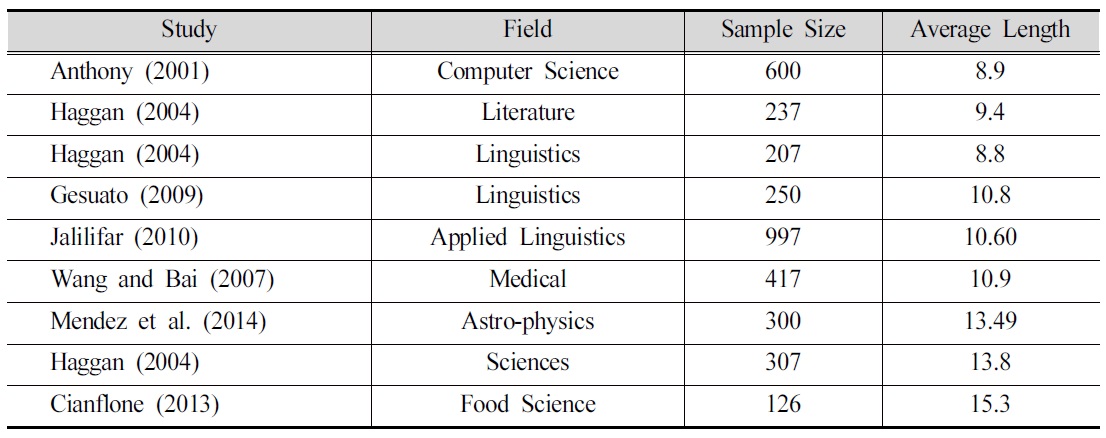
Another title element that earlier research investigated was the uses of punctuation marks. In particular, the previously conducted research examined the use and implications of using colons. For instance,
Other than the length and punctuation marks, prior research studies in this area were carried out for the purpose of examining different forms of titles (e.g., question title). However, most of these studies were conducted from a linguistic point of view with emphasis on discovering common discourse pattern in a particular discipline. The sample data drawn for these studies were generally small due to human decision required in identifying and sorting each of the linguistic elements being studied. For instance,
For this study, a more relevant issue is the type of title and the sort of title elements that readily exhibit cultural characteristics. Arguably, finding title elements that show cultural features could be linked to common linguistic expressions that authors in a given country tend to favor. While
In the case of Korea, for instance, the word "study" in Korean is prevalent in journal article titles. Such choice of words in the Korean academic community may seem like a trivial issue to some academics. Yet, it is an indication of a unique cultural form reflected in a linguistic form that is contrastive to the Western culture. Because of this, traces of culture could be found, especially if this type of claim can be supported with an ample amount of empirical evidences. Unfortunately, as
In a somewhat related study,
The discourse of the academic community supposedly transcends national boundaries. For the most part, in academia, national cultural characteristics should not be a major factor in assessing the quality of research. Academic communities, in general, do not want to emphasize the distinction between native English forms versus a non-native of English forms as suggested in
In sum, the majority of previously conducted research focused on discovering disciplinary differences from a linguistic standpoint. For this reason, most sample sizes that the authors used were rather small. Although there has been a number of previous research studies on titles, previous works on examining nationality-based cultural aspects of journal article titles have been conducted sufficiently. Rather, this study will be emphasizing the cultural similarities as well as the differences between two countries ― South Korea and the U.S. — with respect to journal article titles in the field of social sciences.
The main approach that was employed in this study is to compare the characteristics of journal article titles by comparing the various title elements between the journals published in Korea and the United States. To accomplish this goal, two bibliographic databases —
Both
Similarly, approximately 12,000 titles from journal articles were randomly drawn from the
For the purpose of uncovering cultural similarities and differences, the created datasets were analyzed based on the following criteria:
1. Length of title
2. Title types: colonic, question, and assertive title
3. Frequently used words and phrases based on n-gram
The primary tool to process the downloaded raw data was a UNIX based shell scripting language such as
Moreover, the limitations of this study need to be stated. First, this study relied upon
The purpose of examining the length of the title was to notice the disciplinary characteristics of the social sciences as well as the cultural characteristics between the two countries - South Korean and the U.S. The length of the title was performed by counting the total number of words within the title. For the purpose of this study, a word is defined as a series of character strings that has is bound by a blank space.
The average length of the title was the following:
▪ 14.5 words for the
▪ 11.9 words for
As shown in
<Fig. 1>. Ordered Distribution of Title Length
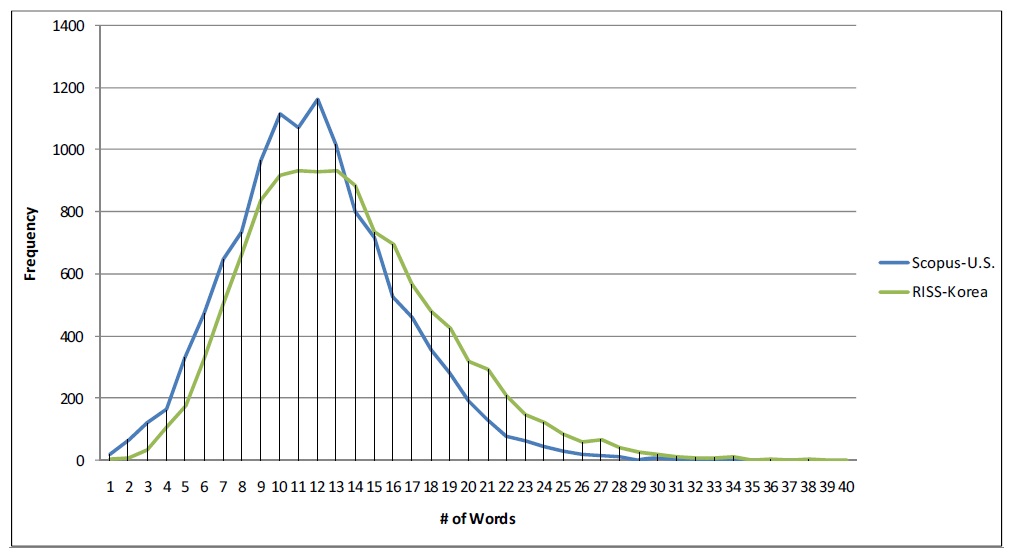
The result shows that the overall length of journal article title in Korea is longer than in the U.S. The average title length between the two countries is 13.1. Overall Korean authors tend to write longer titles in comparison to authors who published in the U.S. based journals. Based on Table 1, it is reasonable to assume that the average length of title in the field of social sciences lies somewhere between computer science and food science. Yet, a point that is more important should be made regarding the length of the title in social sciences. That is, it is difficult to determine the overall length of titles in social sciences because it may depend on each type of discipline within the social science (e.g., psychology versus sociology) and the datasets that are used to find the average length of title. To this end, generalizing based on the
In addition, as shown in
<Tab. 2>. t-Test: Paired Two Sample for Means
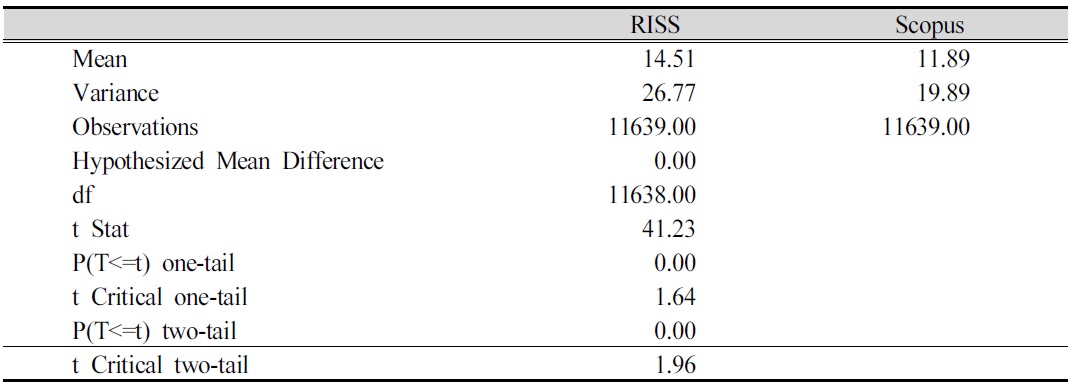
Further observation can be made by considering the probability distribution of the datasets.
<Tab. 3>. Measurement of Kurtosis and Skewness

A possible explanation for the lengthier titles in
The utilization of colon in titles can be simply defined as a title having a colon “:” to separate words or phrases based expressions in a title.
<Tab. 4>. Colonic Titles

The average of title length is also shown in
The result shows that the length of colonic titles is longer than the non-colonic titles. Also, in this table, the average number of words in the colonic titles pertaining to each dataset is shown. For both colonic and non-colonic titles, the length of journal article titles in
Titles in the form of questions or “question title” allows writers to pose a question and to offer one answer to a question and can raise readers’ curiosity
<Tab. 5>. Question Titles
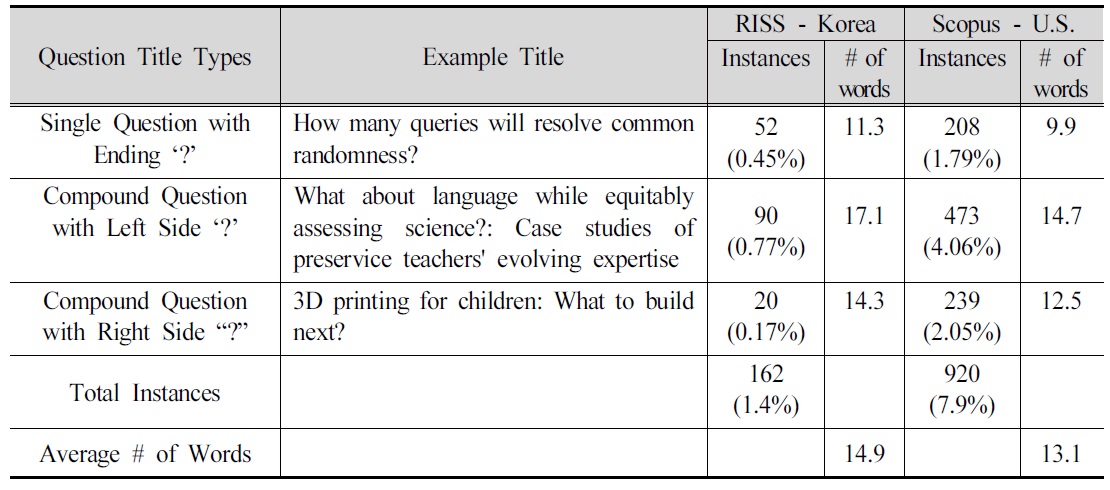
The number of these question titles should be categorized along with the previous works on title length. Ball (2005) has shown that question titles are on the rise in the field of life sciences, medicine, and physics. Whether the increase is applicable to field of social sciences is not yet clear. A study conducted by Ball (2005) has reported that the field of medicine had 6.7% of question titles, which was the highest percentage of question titles among the three fields that the author examined. However, to our knowledge, Ball (2005) published his work in 2005, and, since then, the field of social sciences had not been examined in terms of question titles.
In this study, 7.9% of question titles were found in the
In addition to colons and question marks, this study examined the use of exclamation marks in the titles. For the purpose of this study, assertive titles are defined as titles that contain an exclamation mark !. As in question titles, assertive titles can easily draw attention of readers. The appropriateness of assertive title in journal articles is open to debate.
In any case, whether assertive title is appropriate or not appropriate in journal titles is beyond discussion of this paper. In this study, assertive titles were examined in the context of finding the differences between the two countries and to recognize the pattern in the field of social science. The frequency count of assertive titles is shown
<Tab. 6>. Assertive Titles

In a nutshell,
<Fig. 2>. Comparison of Title Types
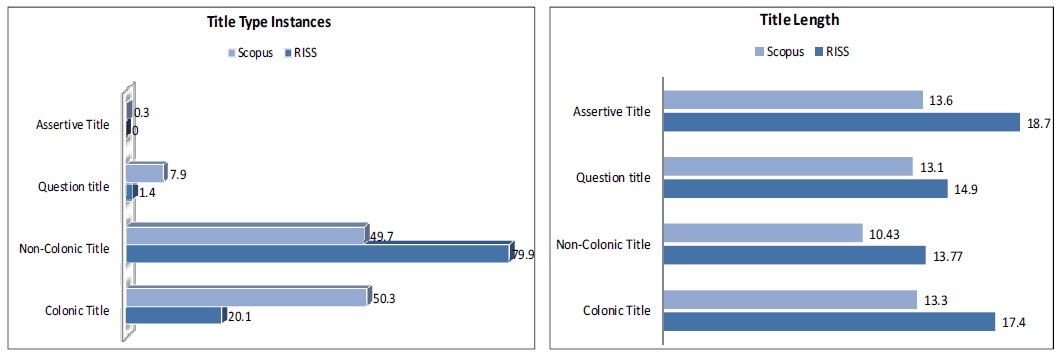
N-gram can be often used to discover useful information in data collection set
A top 50 frequently used bigram appearing in
<Tab. 7>. Top 50 Bigram Phrase List
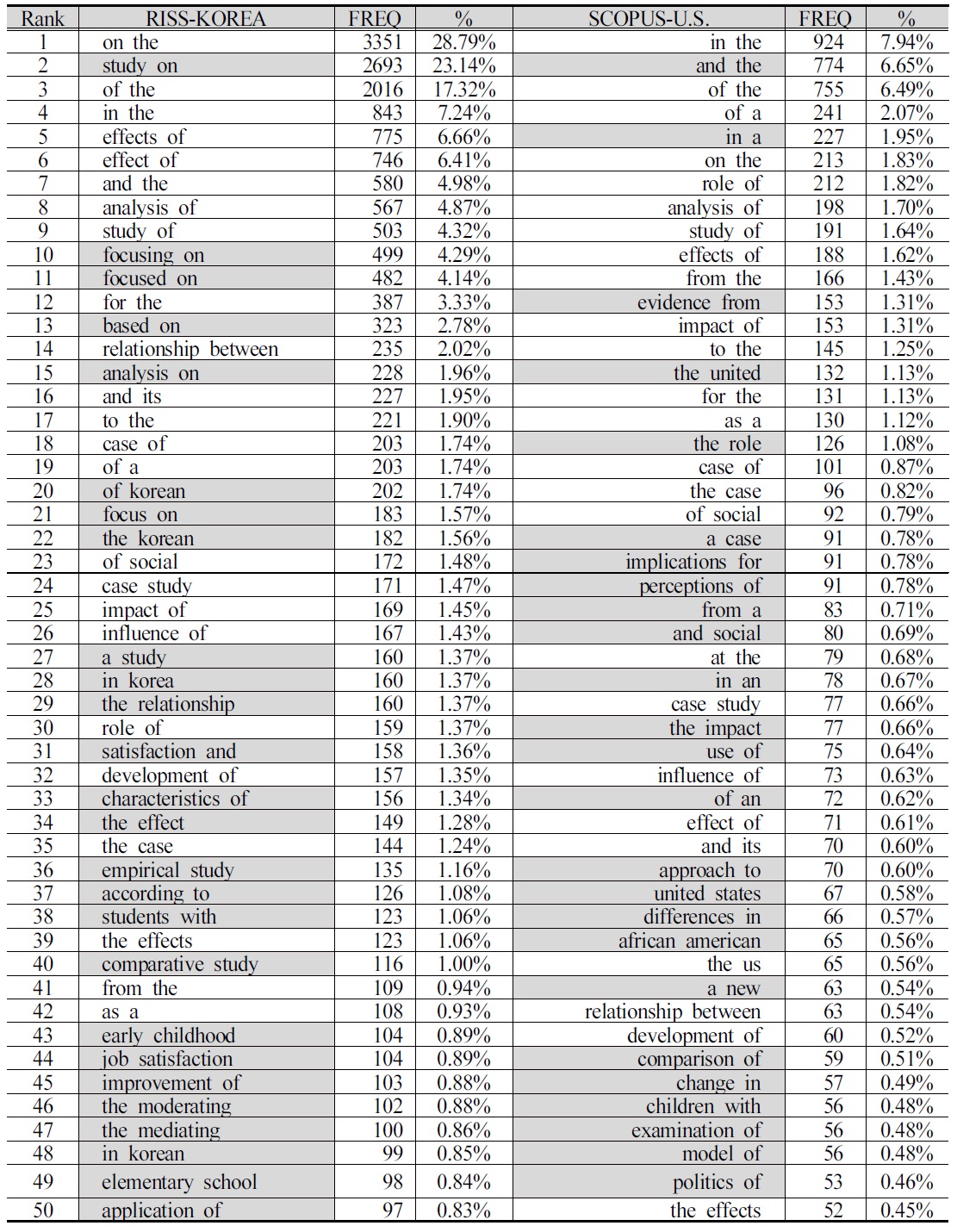
As shown, the most frequently appearing bigram in the
In
<Tab. 8>. Top 50 Trigram Phrase List
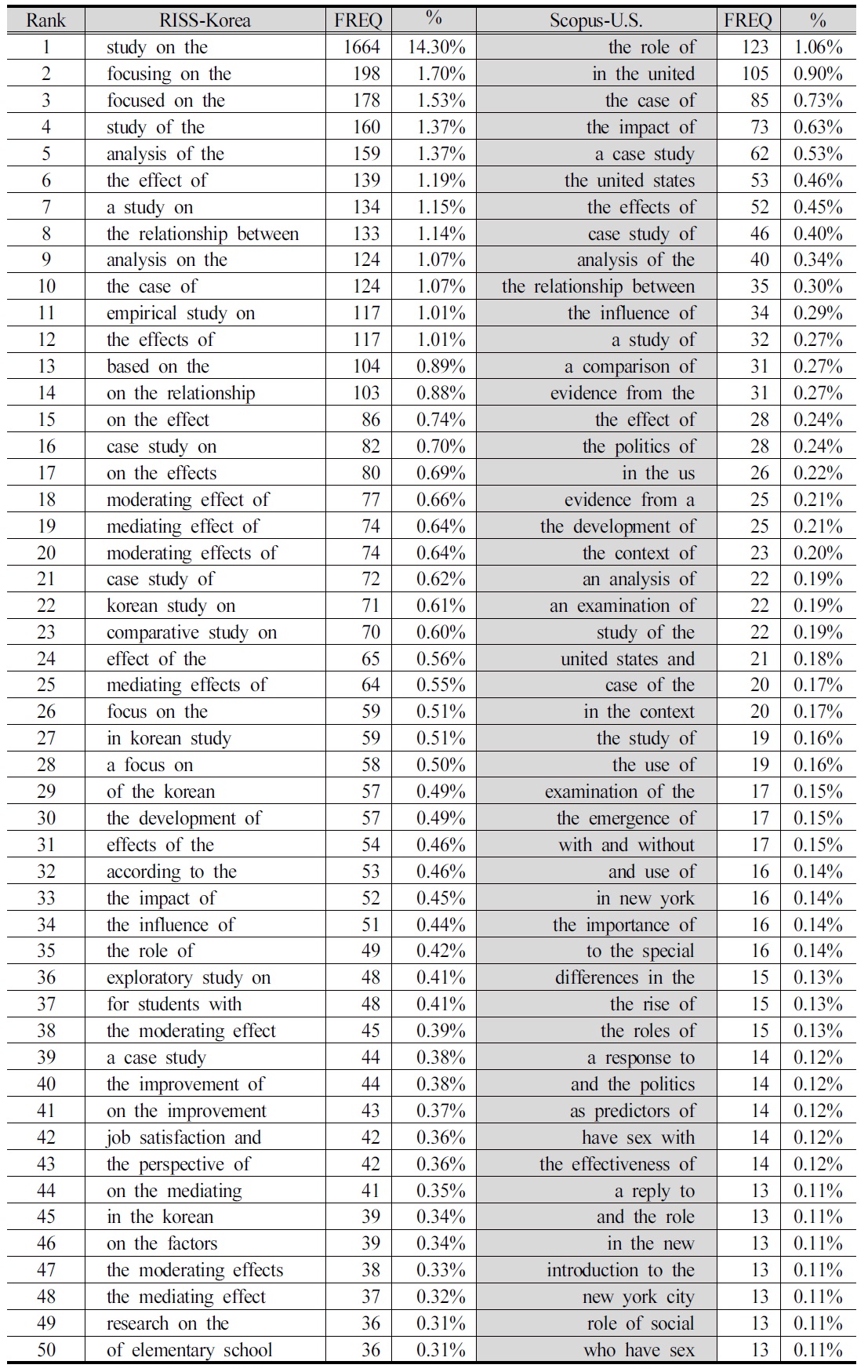
In
For further illustration, the frequency counts of the two selected words are shown as in
<Tab. 9>. Frequently Used Cue Words

In general, the unmatched bigram phrases are of following characteristics:
▪ the nature of topic tends to be in the best interests of a nation-based group of individuals
▪ common collocation of words tends to be used more frequently in one country than another
Bigram or trigram phrases can be categorized based on these criteria. In the later section, there are further illustrations of these points. In essence, bigrams or trigrams can be categorized based on these criteria.
<Tab. 10>. Top 20 List of Bigram Containing the Word “Study”
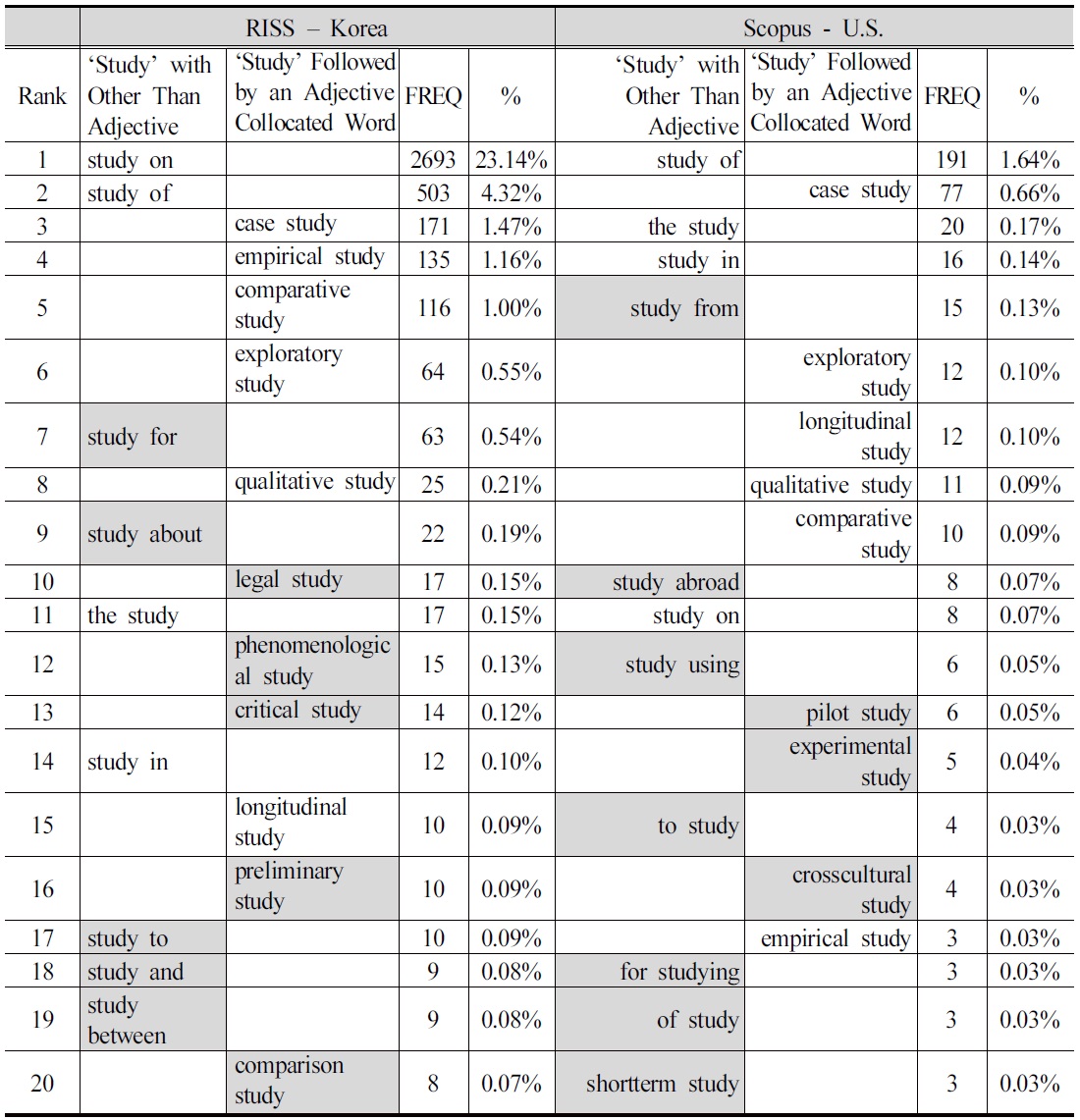
<Fig. 3>. Top 50 Bigram and Trigram Distribution
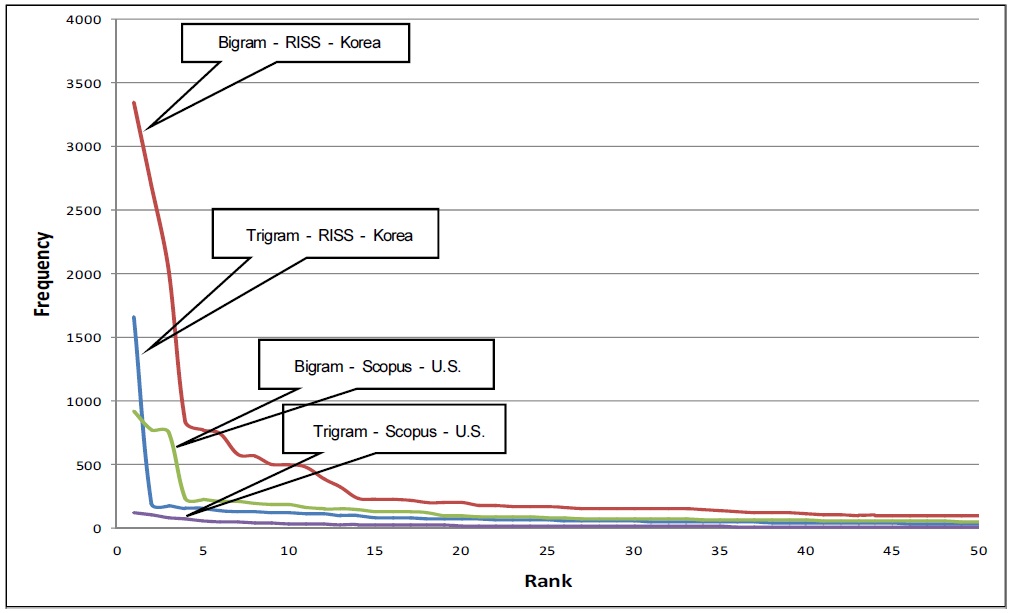
By comparing various syntactic elements in titles between the two countries, features related to native usage and non-native usage could be discovered. For example, the phrases “study for” and “study about” were present 63(0.54%) and 22(0.19%) times respectively in the
Meanwhile, other bigram phrases that contain the word “study” are used in conjunction with an adjective collocated word and could be used to explore and identify the common type of studies that are appropriate for the titles. However, this approach should be adopted with caution since the occurrence of the type of studies in the U.S. is fewer compared to Korea. Based on the frequency count of bigram that contains the word “study”, the sense of native usage to the English language or the norm of discourse community tends to be less popular among authors in the U.S. compared with Korea. An exception to this generality is the use of “case study” as the phrase appeared 77(0.66%) in the
The drawback of this approach is that while each phrase is checked for its uniqueness against increasing amount of matching pool of list, it is possible to miss some of useful bigram phrases that may be unique to a certain degree. The reason is that the process of gaining more matched phrases actually reduces the bigram phrases that appear to be unique in one dataset. The frequency count must be considered in the process of exploring the bigram phrase as the rank alone does not indicate the amount of frequently appearing phrases in the dataset.
In sum, the unmatched phrases with high frequency seem to often suggest various areas and topics in the field of social sciences that authors' interested in each country. The earlier examples demonstrate the application of using n-grams in the context of discovering elements of the culture that are present in the form of linguistic expression. When properly analyzed, a collection of titles can show a vast amount of real world expressions that could be used in constructing titles. The approach that was used in this research can also be suitable for suggesting lexical expressions that can be used in a title. This type of strategy and suggestion, particularly developed as a tool, can be useful in particular for non-native English authors, who may lack abilities to select the appropriate vocabularies and phrases for his or her research topic. However, a larger collection of data is required to develop and validate the n-gram based approach described in this study.
Finally, it is useful to compare the distribution of bigram phrases to the distribution of trigram phrases (Finally, comparing the distribution of bigram phrases with the distribution of trigram phrases are useful for this study).
So far, the journal paper titles published in Korean journals and the U.S. journals have been compared by quantitatively analyzing a number of variables: length, title types, and frequently appearing n-gram matchability. This research has shown that various aspects of cultural phenomenon are reflected in the form of the title. By comparing the
As a whole, the frequent use of words and phrases in the
Even so, how these ideas are linked to the quality of the journal articles is not clear, as it is difficult to find answers to this type of question. Still, the frequent use of words such as “study” in the Korean based journal articles suggests that introspection to writing titles in English seems to be necessary as academic community becomes more globalized. To a certain extent, it appears that Korean authors' description of title is quite limited. Also, we have to recognize the fact that there could be a relationship between lexical strengths and articulating in a title. This possible explanation should be further questioned by academic researchers in this area.
Furthermore, of the interest to Korean academics, quantitative information title such as bigrams and trigrams, if extended, can be useful for those who intend to publish in another country. General guidelines and articles related to writing a research paper and a research article title are available. Yet, quantified information is more useful and has a didactic value for those who want to publish in both countries. While some of differences could be viewed as minor and hard to detect, in the peer review process stylistic titles that still accurately portray the content of the article could be helpful.
For instance, recognizing the tendency of author's formulation of research paper titles in the U.S may help authors who want to avoid
Thus, much information can be useful in assisting authors in the construction of titles, particularly for non-native authors who are less familiar with intricacies of English language.
From the standpoint of improving the quality of academic journals, reviewers of international journals should become aware of cultural elements that tend to exhibit in the form of titles. Korean authors as non-native English authors should make efforts to broaden the appropriate expressions in writing the journal article titles, although the ultimate goal is to use language that is most clear and acceptable in a specific disciplinary community.
Considering all of the above-mentioned points, a number of future areas for research can be recommended. First, further research is needed to confirm the finding in this study since the sample size of the dataset still appears to be small in applying n-gram based approach. Second, additional countries and languages can be examined further in order to validate some of findings in this research. Investigating characteristics of titles in other countries can aid in finding commonly used linguistic expressions as whole. Finally, a study to examine the equivalency of titles in Korean to titles written in English can be carried out as the degree to which the Korean influences authors in writing titles in English is still not certain.
In a nutshell, this paper has shown that there is a considerable amount of culturally related variability in constructing the title of journal articles. Future studies related to titles should be more sensitive to cultural elements. Generalizing the title related research in the context of nationality should be more appropriately mentioned in order to avoid making over-generalized statements in regards to journal article titles.
1.
[journal]
Anthony, Laurence.
2001
“Characteristic Features of Research Article Titles in Computer Science.”
IEEE Transactions, on Professional Communication
44(3)
: 187 - 194
10.1109/47.946464
![]()
2.
[journal]
Ball, Rafael.
2009
“Scholarly Communication in Transition: The Use of Question Marks in the Titles of Scientific Articles in Medicine, Life Sciences and Physics 1966–2005.”
![]()
3.
[other]
Ballesteros, Francisco, Rica, Pedro, Neff, Joanne.
“The ICLE Error Tagging Project: Analysis of Spanish EFL Writers.”
4.
[journal]
Buckland, Michael K..
1991
“Information as Thing.”
![]()
5. [book] Cianflone, Eugenio. 2013 “Framing Research in Food Science: The State of the Art on Research Articles, Short Communications and Poster Presentations.” 269 - 286 BIBLID, Universidad de Las Palmas de Gran Canaria: Departamento de Filología Moderna
6.
[journal]
Dahl, Trine.
2004
“Textual Metadiscourse in Research Articles: A Marker of National Culture or of Academic Discipline?”
![]()
7.
[book]
Dougherty, Dale, Robbins, Arnold.
1997
8. [book] Frankenberg-Garcia, Ana. 2009 “Are Translations Longer than Source Texts.” A Corpus-Based Study of Explicitation In: Beeby, A., Rodríguez P. and Sánchez-Gijón, P.(eds.) Corpus Use and Learning to Translate (CULT): An Introduction. 47 - 58 John Benjamins
9. [book] Gesuato, Sara. 2009 “Encoding of Information in Titles: Academic Practices across Four Genres in Linguistics.” In Taylor, C. (Ed.) Ecolingua: The Role of E-Corpora in Translation and Language Learning 125 - 157 EUT
10. [other] Ha, Le Quan, Ha, Le Quan. 2002 “Extension of Zipf’s Law to Words and Phrases.” Proceedings of the 19th International Conference on Computational Linguistics, 1 Association for Computational Linguistics 1 - 6
11.
[journal]
Haggan, Madeline.
2004
“Research Paper Titles in Literature, Linguistics and Science: Dimensions of Attraction.”
![]()
12.
[journal]
Hartley, James.
2005
“To Attract or to Inform: What Are Titles For?”
![]()
13.
[journal]
Hartley, James.
2007
“Colonic Titles.”
14.
[journal]
Jalilifar, Alireza.
2010
“Writing Titles in Applied Linguistics: A Comparative Study of Theses and Research Articles.”
15.
[journal]
Jamali, Hamid R., Nikzad.
2011
“Article Title Type and Its Relation with the Number of Downloads and Citations.”
![]()
16.
[journal]
Lewison, Grant, Hartley, James.
2005
“What’s in a Title? Numbers of Words and the Presence of Colons.”
![]()
17.
[journal]
Mendez, David I., Alcaraz, M. Ángeles, Salager-Meyer, Françoise.
2014
“Titles in English-Medium Astrophysics Research Articles.”
![]()
18.
[journal]
Nakamaru, Sarah.
2010
“Lexical Issues In Writing Center Tutorials With International and US-Educated Multilingual Writers.”
![]()
19. [web] Understanding Metadata. http://www.niso.org/publications/press/UnderstandingMetadata.pdf
20.
[book]
Peat, Jennifer, Elliott, Elizabeth, Baur, Louise, Keena, Victoria.
2002
21.
[journal]
Rath, Alex.
2010
“Temporal Function of Research Process Nominal Groups in the English Titles of.”
22.
[journal]
Romer, Ute, Arbor, Ann.
2009
“English in Academia: Does Nativeness Matter.”
23.
[book]
Sewell, William H..
2005
“The Concept (s) of Culture.”
24.
[journal]
Soler, Viviana.
2007
“Writing Titles in Science: An Exploratory Study.”
25.
[journal]
Subotic, Sinisa, Mukherjee, Bhaskar.
2014
“Short and Amusing: The Relationship between Title Characteristics, Downloads and Citations in Psychology Articles.”
![]()
26. [other] Sureka, Ashish, Goyal, Atul. “Insights on Transferability of Dialog-Act Cue-Phrases Across Communication Domains, Modality and Semantically Similar Dialog-Acts.” 8th International Conference on Natural Language Processing (ICON). 28 - 37
27.
[journal]
Thanopoulos, Aristomenis, Fakotakis, Nikos, Kokkinakis, George.
2002
“Comparative Evaluation of Collocation Extraction Metrics.”
28.
[book]
Vinay, Jean-Paul, Darbelnet, Jean.
1958
29.
[journal]
Wang, Yan, Bai, Yongquan.
2007
“A Corpus-Based Syntactic Study of Medical Research Article Titles.”
![]()
30. [other] Wong, Sze-Meng Jojo, Dras, Mark. “Contrastive Analysis and Native Language Identification.” Proceedings of the Australasian Language Technology Association Workshop. 53 - 61